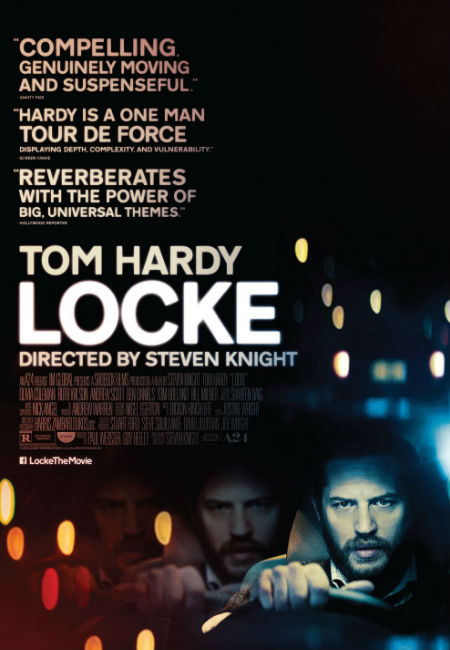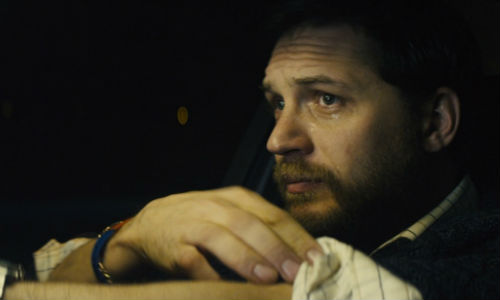
Bored children kicking the seats of harried parents before them might disagree but a lot can happen in one car journey.
It is certainly the case for Ivan Locke (Tom Hardy), the protagonist of Steven Knight’s tautly-delivered drama Locke, a building project manager of nine years experience, who finds himself hurtling down the M6 to London late one evening, leaving a major, multi-million dollar concrete pour for his latest building the next morning – he refers to them almost lovingly, possessively as if they are living things to be nurtured – hanging in the balance.
(For some reason the exact number of years becomes critically important for the first composed, then deeply-unsettled, man; you suspect because it is one of the few incontrovertible facts in a sea of unarguable, highly subjective opinions.)
Though he appears to move with purpose and determination, calmly switching lanes, working, he admits to a “list” – a coldly clinical admission which does not go down well with the fraught person he is on the phone with at the time – he is a man desperately struggling to keep in place the many carefully-laid, artfully-maintained, building blocks of his life.
Unfortunately for Ivan, the most recent son of a family line with an unenviable reputation for making as little as possible out of life, drinking and abrogating responsibility as it goes, who has painstakingly worked to be the responsible one, the dependable, the present one (that last quality is critically important as you discover), no amount of cool-headed thinking or steel-eyed execution is going to stop his house of cards from collapsing in spectacular fashion.
Known as a man, professionally and personally, with his finger on the pulse, his eye on the ball – literally in the case of the football games he and his sons Sean and Eddy watch together with fanatical, analytical devotion; one of which he is missing to make his mercy dash to England’s capital – he is firmly of the belief that he can rescue the impending collapse of his life, that it is possible to come with a “practical plan” to sort it all out.
But as Ivan discovers on the hour and half drive to London, which is largely the running time of this remarkable film in which Hardy is the only visible actor, hurtling down the road alone, all the lists and plans in the world cannot make up, quickly and cleanly at least, or likely at all, for one drunken, poor decision late at night far away from home.
It is then, at the successful conclusion of a major trouble-plagued project, celebration top most in mind and too many beers behind him, that he, the “last man in the world” who would do such a thing, sleeps with his assistant, Bethan, a woman who, in his words, “barely bothers with life” (a crime in the relentlessly straining-to-be-the best-person-possible world of Ivan Locke).
And it is the birth of the baby he is having with her that impels him to risk his marriage to Katrina, close relationships with sons Sean and Eddy, and his highly-valued career, working with his boss Gareth and assistant site worker Donal, to race to her side, determined not to be the largely absent, “weak” man his father, now dead, was.

It is these people that he spends the entire trip on ever more frantic phone calls with, conversations that become ever more fraught, more emotional; although you often would never guess it from Locke’s measured, calm tones, which stay professionally neutral even as tears stream his face.
It is only in the silent moments between the calls that he swears, screams, bangs the steering wheel in rage and engages in bitter, contempt-filled, self-justifying diatribes with his imaginary father who is represented only by an empty, accusing back seat.
That this to hell and back and back to hell again journey of the soul takes place only in the tight confines of Locke’s luxury car, adds a suffocating claustrophobia, an emotional impotence, to his fight to remain the man he has fought his whole life to be, and which he has largely been save for this one uncharacteristically sloppy mistake.
Hardy is breathtakingly good in the role of Locke, channelling a thousand degrees of desperation into the portrayal of man who placed a heavy burden on himself many years earlier to be the first worthy holder of the family surname, and who discovers that the intent to live up to his exhausting, self-imposed mandate is not enough to make up for the absence of his famous self-control on one life-changing night.
(As his wife makes clear repeatedly, the difference between “never” and “once” is an almost unbridgeable gap, one that can’t be broached easily, if at all, by noble intent or post-act apologies.)
He takes the beautifully-articulated script by director Steven Knight and in one tension-filled take, which was repeated many times over a week to give both Hardy and the crew the chance to maximise the use of the best angles to capture his face on which much of the barely-contained (but contained nonetheless, giving you some idea of the fearsome self-control in place) emotional disintegration is played out.
You may wonder if one man in one car can hold your attention for the 90 minute running time of Locke, but as fellow actors Colin Farrell (Phone Booth) and Ryan Reynolds (Buried) demonstrated, when there is enough at stake, and you have the right actor to deliver it, the result is never less than utterly-riveting, thoroughly compelling human drama of the highest order.